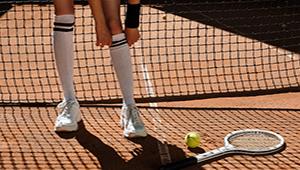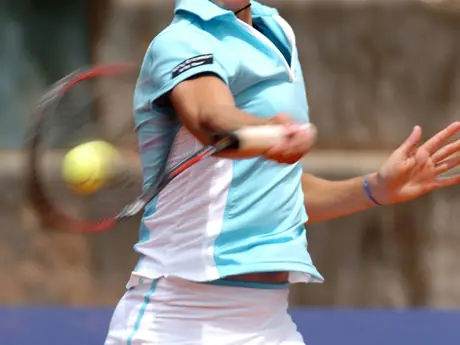
Mental toughness plays a big part in your success on the court. It can help a player who is feeling out matched win. Without it, a skilled player can fall apart and lose.
Next time you're on the court, follow these six tips to help you stay calm and beat your opponent.
Use the Warm-Up Strategically
Use this time to get used to the conditions of the court and environment. Is it windy or hot? Are you feeling stiff from that strength training session earlier in the week?
From the first shot of a match, a player has to be ready to react quickly. Before the match, take five minutes to work up a little sweat. Skip or jog around the court, shuffle, do grapevines or try butt kicks.
Spend some time hitting ground strokes, volleys, overheads and serves. Adjust your shots to the conditions. If it's windy, take note of the direction. Those high lobs might not work on a windy day, but a topspin baseline shot will.
Give Yourself Time to Adjust
Most players don't play the same in a warm-up as they do in a match. Your opponent, who was ripping a down-the-line forehand in the warm-up, might start pushing the ball during the match or their serve suddenly is flat and fast.
Be patient and give yourself time to adjust. Don't get too emotional if your opponent dominated the first game. There's a long way to go in the match. Think back to your previous matches and remember tricks you used to get your timing. Watch the ball. Are you hitting it late? Are you lunging for the ball? Adjust your footwork and timing until you start hitting cleanly.
Don't Blast Your Serve
You can't win a match if your serve is weak or if you double fault. If you're struggling with your serve, you'll be on the defensive the entire match.
Don't serve at full power from the every beginning of the match. Focus on your form and timing and then increase the speed as your confidence grows.
Focus on the Basics First
You need to get your body and head into the game before you pull out those specialty shots. Focus on your ground strokes and hitting the ball cross court about 2 to 5 feet over the net. Put more topspin on the ball if you're hitting a little long.
Once your cross court is tuned up, you can start using the tougher down-the-line shots.
If you're playing singles, it might be awhile before you come to net for a volley or overhead. If you completed a proper warm-up, you will have at least practiced the shot before the match.
Still, don't expect that first overhead to be perfect. Nerves and footwork can ruin the shot. Don't let it discourage you or avoid the net because of one poor volley.
Find Weaknesses
You're two games into the first set and your ground strokes and serves are where they should be. Now it's time to pay attention to your opponent—particularly his or her weaknesses.
What are your opponent's weaknesses and strengths? Does your opponent protects his or her backhand? If so, start hitting the ball deep to their backhand.
Look to exploit the weakness with your strengths. And remember that your opponent might be using the same tactic. Don't openly display your own weaknesses.
Avoid Mental Gymnastics
You just broke your opponent's serve and have the momentum. It's right about now when tennis players start pushing the ball and playing it safe. You quickly lose your timing and your opponent sees an opening. Before you know it, your lead is gone and you're on the defensive.
Don't fall into this rut.
Instead, tell yourself you want to finish the set. Using affirmative thoughts can be helpful. Think to yourself "I will hit through the ball," "I will finish this game," or "I will move my feet."
Recent Articles:
- How to Build a Strong Core for Tennis
- How to Hit the Perfect Forehand
- How a Tennis Ball Can End Hip Pain
 Find more tennis tips.
Find more tennis tips.
About the Author









Discuss This Article